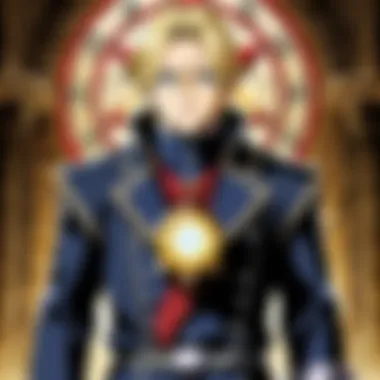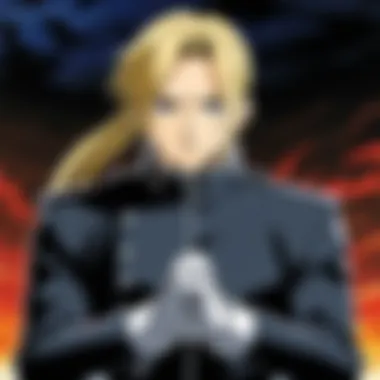Exploring the Depths of Fullmetal Alchemist Light Novels


Intro
The Fullmetal Alchemist light novels provide fans a deeper dive into a universe rich with lore and complex characters. While the original manga and anime series captivated audiences with their engaging storylines and philosophical questions, the light novels expand on this foundation, offering unique insights and further exploring themes not fully addressed in the primary works. This article embarks on a thorough examination of these texts, revealing how they intertwine with the broader narrative and resonate with various audience demographics.
Featured Series or Manga
Overview of the Series
Fullmetal Alchemist, created by Hiromu Arakawa, first appeared as a manga series serialized in Square Enix's Monthly Shōnen Gangan magazine. Following the adventures of two brothers, Edward and Alphonse Elric, the story intertwines elements of alchemy, a quest for redemption, and explorations of morality. Light novels such as "Fullmetal Alchemist: The Land of Sand" and "Fullmetal Alchemist: The Sacred Star of Milos" serve to fill gaps in the narrative, providing supplementary tales that enhance the original plot.
Key Characters and Development
The light novels introduce characters that either complement or deepen the understanding of main characters. For example, the expanded roles of figures like Roy Mustang and Riza Hawkeye reveal their motivations and backgrounds, providing fans with greater context for their actions in the manga. Such developments enrich the narrative and create a more complex web of relationships, expanding the emotional depth of the story.
Character Analysis
Major Characters
The primary focus of the light novels often remains on the established characters, like Edward and Alphonse. However, lesser-known characters such as Scar or the homunculi also receive attention, thereby enhancing their significance within the overall narrative. Scar's struggles with vengeance and redemption illustrate broader themes that resonate throughout the Fullmetal Alchemist universe.
Character Arcs and Growth
Each character's growth is pivotal to the understanding of the broader narrative. Edward's journey from a brash youth seeking power to a more reflective individual grappling with the consequences of his actions is paramount. In the light novels, this character arc continues to develop as he faces new challenges, forcing him to confront his ideals and decisions.
Thematic Exploration
Main Themes and Messages
The Fullmetal Alchemist light novels delve into themes of sacrifice, humanity, and the moral implications of power. By exploring these concepts, the novels not only enhance the series as a whole but also offer a lens through which readers can reflect on their own lives. The struggle between personal desires and greater good is a message that resonates throughout the works.
Cultural Context and Influences
The setting of Fullmetal Alchemist draws heavily from European culture while weaving in elements of Japanese storytelling. This fusion creates a unique narrative experience that appeals to a global audience. Understanding these cultural influences adds depth to the reading experience, allowing fans to appreciate both the story and its roots more fully.
The light novels act as a bridge, linking character motivations and philosophical inquiries that may only be hinted at in the manga or anime.
Preface to Fullmetal Alchemist
The world of Fullmetal Alchemist extends beyond its successful manga and anime adaptations, encompassing a rich and layered universe that continues to engage fans. This article aims to delve into the significance of the Fullmetal Alchemist light novels. These narratives not only build upon the established lore but also offer fresh perspectives on characters and themes, enriching the overall experience for readers.
Exploring the Fullmetal Alchemist light novels serves several purposes. First, it offers insights into the motivations and backstories of cherished characters. Second, the novels elaborate on complex themes, such as alchemy and morality, that resonate deeply in the context of the series. Finally, understanding the transition from manga to light novels helps illustrate how this format evolves storytelling.
By analyzing these elements, we can appreciate the intricate work that goes into creating narratives that appeal to both long-time fans and newcomers alike.
Overview of the Franchise
Fullmetal Alchemist began as a manga series written and illustrated by Hiromu Arakawa. First serialized in 2001, it quickly garnered a large following due to its intricate plot and well-developed characters. The story revolves around the Elric brothers, Edward and Alphonse, who use alchemy in their pursuit of redemption after a tragic accident. The franchise expanded into two anime adaptations, a live-action film, and, ultimately, light novels, each adding layers to the story.
The franchise's strong emphasis on themes such as family, sacrifice, and the moral implications of power has resonated with a diverse audience. Notably, the depth of character development and philosophical discussions set it apart from other works in the shōnen genre. This strong foundation paved the way for the light novels to explore even further depths of the narrative.
The Transition from Manga to Light Novels


The movement from the manga format into light novels signifies a strategic expansion of the franchise's narrative scope. Light novels allow for deeper exploration of characters and plots that may have been lightly touched upon in the original series. While manga relies on sequential art, light novels depend heavily on prose, permitting a more introspective approach to storytelling.
Readers can expect more nuanced character analysis through inner thoughts and feelings, which may not be as evident in the manga. This transition also accommodates new stories that complement the original narrative, offering fresh insights and expanding the universe further.
In light novels, the pacing adjusts to allow for character growth and philosophical discussions, providing a reflective lens on the choices made by protagonists. For fans already familiar with the storyline, this offers a rich narrative experience that deepens their appreciation of the entirety of Fullmetal Alchemist.
Understanding Light Novels
Light novels occupy a unique niche within the literary landscape, particularly in Japan. They are more than just a format; they serve as a bridge between manga and traditional literature. Understanding their structure, themes, and audience is essential to appreciate the depth they bring, especially in the case of the Fullmetal Alchemist light novels.
These novels often combine illustrations with prose, creating a distinctive reading experience. The hybrid nature allows for a shorter, more digestible narrative while still engaging readers in a detailed storyline. This format is appealing not only for younger audiences but also for adult readers seeking something different from conventional novels.
Moreover, the light novel format enables authors to explore deeper themes often overlooked in mainstream manga. Philosophical discussions, character growth, and complex moral dilemmas can be presented more freely and thoroughly. As such, the exploration of light novels in this article is crucial to understand how they expand the rich lore of the Fullmetal Alchemist universe.
Definition and Characteristics
A light novel is typically characterized by its concise writing style and inclusion of illustrations. On average, these novels contain between 40,000 and 50,000 words, which is shorter than traditional novels. This allows for quicker consumption. Moreover, they often target a younger demographic but have gained traction among older readers as well.
Key characteristics include:
- Illustrations: These are usually embedded throughout the text, enhancing visual appeal and providing context.
- Serialized Format: Many light novels are released in volumes and often published serially, making them part of an ongoing narrative.
- Genre Diversity: They encompass various genres, from fantasy to romance, ensuring wide appeal.
The Popularity of Light Novels in Japan
Light novels are immensely popular in Japan, becoming a cultural phenomenon. Their accessibility and engaging narratives resonate with the youth, while also capturing the interests of older readers. The advent of digital platforms has further fueled this growth, enabling readers to access light novels with ease.
Factors contributing to their popularity include:
- Easily Digestible Content: The shorter format is perfect for busy lifestyles. Readers appreciate being able to complete a novel quickly.
- Adaptation Potential: Many light novels have been adapted into anime and manga. This cross-media appeal boosts their visibility and draws in new audiences.
- Community Engagement: Online forums and social media platforms, such as Reddit and Facebook, have nurtured communities around these novels, fostering discussion and enthusiasm.
In summary, understanding light novels is pivotal in exploring the Fullmetal Alchemist series. They not only enhance the narrative but also reflect a dynamic cultural trend that continues to shape modern storytelling.
The Fullmetal Alchemist Light Novels
The significance of the Fullmetal Alchemist light novels extends beyond mere storytelling. They serve as a bridge between the original manga and the broader universe the franchise has created. These novels not only expand the lore but also delve deeper into character development and thematic explorations. By analyzing their contributions, readers can appreciate the subtle intricacies that define their appeal, and understand how they resonate with both longstanding fans and newcomers.
Overview of the Novels
The Fullmetal Alchemist light novels consist of several volumes that expand on the narrative established in the manga by Hiromu Arakawa. While the manga primarily focuses on the overarching quest of the Elric brothers, the light novels delve into various side stories and character backgrounds. They enhance our understanding of the world of Amestris, exposing readers to events and details that were either glossed over or omitted in the manga and anime adaptations.
Through these novels, readers are introduced to new characters, expanded narratives, and unique scenarios that enrich the established universe. They reflect the same high-quality storytelling evident in the original work while exploring different facets of familiar characters. This expansion makes the novels a crucial part of the Fullmetal Alchemist franchise.
Main Themes Explored
Alchemy and its Philosophical Implications
Alchemy serves as the backbone of the Fullmetal Alchemist light novels. This exploration goes beyond the scientific aspects of alchemy into philosophical inquiries about existence, sacrifice, and the nature of life itself. The novels invite readers to ponder profound questions, such as the ethics of using alchemy for personal gain versus collective good.
The unique feature of exploring alchemy's philosophical implications is its thought-provoking quality. Readers who engage with this theme find themselves reflecting on their own moral stances. The advantage of this exploration in the context of the light novels is the depth it provides; each instance of alchemy challenges characters and readers to reconsider the consequences of their actions within both personal and societal contexts.
The Nature of Humanity


Within the light novels, the theme of humanity is intricately intertwined with the concept of alchemy. The novels examine what it means to be human through the trials of characters like Edward and Alphonse Elric. Key characteristics reveal the struggles, triumphs, and vulnerabilities that define human existence.
This unique aspect of humanity in the novels heightens the emotional stakes of the narrative. By examining the imperfections and complexities of the characters, readers become connected to their journeys. The advantage of this exploration lies in its relatability; readers can see parts of themselves in these characters, making their struggles resonate on a personal level.
Moral Dilemmas and Choices
The Fullmetal Alchemist light novels are rich with moral dilemmas that challenge characters' values and choices. These dilemmas are not simple, often presenting characters with situations where there’s no clear right or wrong. The novels exemplify the burden of decision-making and the far-reaching consequences of those choices.
A key feature of this exploration emphasizes the importance of choice in shaping one’s identity. Every decision made by the characters serves as a reflection of their development. The advantage of presenting moral dilemmas in this format is that it compels readers to engage critically with the text, contemplating their beliefs about ethics and the responsibilities that come with power.
Character Development in the Novels
Character development is a fundamental component of any narrative, influencing not only the storyline but also the audience's emotional engagement. In the context of the Fullmetal Alchemist light novels, character arcs are intricately woven, showcasing personal struggles and evolving relationships. These elements deepen the reader's understanding of an already rich universe. Through these novels, the characters are not just vessels of the story but are also reflections of profound themes such as morality, redemption, and the essence of what it means to be human.
Key Characters and Their Arcs
Edward Elric
Edward Elric serves as the primary protagonist in the Fullmetal Alchemist series. His character is defined by intense determination and a desire for redemption after a failed alchemical experiment that costs him dearly. Edward's journey is one of self-discovery and moral questioning, making him a central figure to discuss in this article. His relentless pursuit to restore what he has lost exemplifies a strong will that many readers admire.
One of Edward's key characteristics is his sharp intellect and proficiency in alchemy. This duality creates a unique perspective on power and responsibility, allowing readers to explore the repercussions of human ambition. Edwards’s flaws, such as his pride and stubbornness, also showcase his humanity, making him relatable. Ultimately, his character arc contributes significantly to the overarching themes present in the light novels.
Alphonse Elric
Alphonse Elric, Edward's younger brother, plays a crucial role in the narrative's exploration of sacrifice and brotherhood. The loss of his physical body and existence in a suit of armor is a poignant symbol of the consequences of their actions. Throughout the novels, Alphonse serves as a moral compass, often reminding Edward of the core values they should uphold. This attribute adds depth to their relationship and emphasizes loyalty and love.
What makes Alphonse's character particularly interesting is his unwavering optimism in the face of adversity. He reflects a more compassionate side to the harsh world of alchemy, making him a beneficial character for this analysis. His innocence contrasts Edward's more jaded perspective and invites exploration of the different forms of strength. Ultimately, Alphonse's character enhances the emotional impact of the story, offering a nuanced take on the themes of loss and recovery.
Roy Mustang
Roy Mustang, the Flame Alchemist, represents ambition intertwined with political complexity. As a high-ranking military officer, Mustang's character delves into the ethics of power and the burdens of leadership. His aspirations to ascend the ranks of the military to enact change reveal the darker undercurrents of authority's corruption. Mustang's character is well-suited for deep analysis due to his charismatic yet manipulative nature.
A key characteristic of Mustang is his ability to manipulate fire, which symbolizes his volatile and passionate personality. This ability reflects both his destructive potential and his role as a protector, creating a duality that enriches his character. Mustang's interactions with other characters often pivot on themes of trust, manipulation, and sacrifice, making him an essential part of the narrative. His complex nature enhances critical discourse around power dynamics within the story.
Supporting Characters' Contributions
Supporting characters, while often overshadowed by the main trio, significantly enrich the narrative tapestry of the Fullmetal Alchemist light novels. Each contributes to the central themes and provides necessary contrasts to the main characters. They often serve as catalysts for change and development, shifting the narrative's dynamics and pushing the protagonists toward growth.
For instance, characters like Riza Hawkeye and Maes Hughes offer viewpoints that inform the reader's understanding of the military's complexities and the essence of true loyalty. Their interactions with Edward, Alphonse, and Roy also highlight various aspects of morality, friendship, and sacrifice.
Moreover, by analyzing these supporting characters, we can see the greater moral landscape the protagonists navigate, illustrating that true development often comes from the relationships they build along the way. In essence, their contributions are not mere background roles; they provide essential insights that deepen the overall themes of the story.
Comparative Analysis with Other Media
The section on comparative analysis with other media enables readers to understand the unique position of the Fullmetal Alchemist light novels within the larger narrative framework of the franchise. By contrasting the light novels with both the original manga and the various anime adaptations, we gain insight into how each medium interprets the story and character development. Such analysis reveals not only the strengths and weaknesses of each format but also provides deeper appreciation of the thematic elements embedded in the Fullmetal Alchemist universe. The light novels expand on details that may be glossed over or represented differently in the manga or anime, enriching the overall storytelling experience.
Comparison with the Original Manga
The original manga of Fullmetal Alchemist, created by Hiromu Arakawa, lays the foundational world that the light novels build upon. One major aspect is the depth of character exploration. While the manga provides a strong narrative arc, the light novels delve deeper into character backgrounds and motivations. For example, the internal struggles faced by Edward and Alphonse are given more space to breathe in the light novels. This allows their development to unfold gradually, offering a nuanced take on their respective journeys.
In addition, the light novels introduce new plots and side stories that enrich the existing lore. These additions often pivot around secondary characters, giving fans a broader context to understand their relation to the main narrative.


Furthermore, the light novels take liberties with pacing that the manga does not. This alteration often affords a more contemplative approach to complex themes, such as the philosophical nuances of alchemy and morality, which can sometimes feel rushed in the manga form.
"The light novels serve as a reflective mirror to the original manga, often revealing facets of story and character that expand the reader's understanding far beyond the graphic limitations of comic panels."
Contrasts with the Anime Adaptations
When we turn our focus to the anime adaptations, the differences become even more pronounced. While both adaptations, 'Fullmetal Alchemist' and 'Fullmetal Alchemist: Brotherhood,' engage with the source material, they diverge significantly in narrative choices and thematic emphasis.
For instance, 'Fullmetal Alchemist' follows a more original storyline that eventually veers away from the manga, introducing unique character arcs and diverging plots, such as the introduction of characters and events that do not appear in the manga or light novels. On the other hand, 'Fullmetal Alchemist: Brotherhood' attempts to stick closer to the original source material, but it still condenses and modifies certain elements for pacing and dramatic effect.
The light novels add even more layers. They can expand on moments that are shortchanged in the anime, providing richer detail and reflection. This can be particularly significant with respect to character intentions and moral dilemmas.
Moreover, the emotional weight of certain scenes is often more palpable in the light novels due to their ability to explore characters’ thoughts in depth. This is something that visual storytelling sometimes cannot convey as effectively. Characters’ inner dialogues and thoughts are vital for understanding the emotional tapestries that underpin their decisions.
In summary, the comparative analysis sheds light on the myriad ways each medium interprets and adds to the Fullmetal Alchemist universe. The manga serves as the backbone, while the anime adaptations and light novels offer their unique perspectives that enrich the audience's understanding and appreciation of this celebrated franchise.
Cultural Impact of the Light Novels
The cultural impact of the Fullmetal Alchemist light novels cannot be overlooked. They extend the reach of the franchise beyond its original manga and anime adaptations, drawing in both dedicated fans and new audiences. The novels add layers to the existing story, enriching the characters and themes that resonate with readers worldwide. By analyzing the reception of these novels, one can better understand their role in shaping the cultural narrative surrounding Fullmetal Alchemist.
Reception in Japan
In Japan, the Fullmetal Alchemist light novels have received acclaim for their exploration of complex themes and character depth. This popularity can be observed through their sales figures and critical reviews. Many readers appreciate how the novels elevate the storyline, offering new perspectives on familiar events and characters.
The Japanese audience connects deeply with themes of identity, sacrifice, and redemption, which are prevalent throughout the novels. As a result, the light novels have contributed significantly to discussions in forums and social media platforms, indicating their success in engaging with the fanbase. Reviewers frequently cite the emotional weight and philosophical depth of the narratives as key factors in their positive reception. Overall, the response in Japan highlights the novels' ability to transcend traditional storytelling boundaries.
Global Appeal and Influence
Outside of Japan, the Fullmetal Alchemist light novels have managed to cultivate a following that appreciates their contribution to the franchise. Fans across different cultures find value in the intricate storytelling and character arcs that are expanded in these novels.
The global appeal is evident through various translations and adaptations that have made the novels accessible to a wider audience. Readers appreciate the diverse themes that are relatable across different contexts. Themes such as the moral implications of alchemy, the quest for knowledge, and the nature of humanity hold universal relevance.
Moreover, the light novels influence not just readers but also writers and artists within the anime and manga community. They serve as a source of inspiration for new works, showcasing how supplementary literature can enhance or redefine existing narratives. The cultivation of a dedicated fanbase around the light novels ensures that they continue to play a significant role in the ongoing legacy of the Fullmetal Alchemist franchise. This dynamic relationship between the novels and their global audience underscores the impact of Fullmetal Alchemist as a cultural phenomenon.
"The Fullmetal Alchemist light novels are not just an extension of the story; they are a deep dive into the philosophy and humanity embedded within the narrative."
Finale
The topic of the conclusion is paramount to any comprehensive examination of the Fullmetal Alchemist light novels. It serves as a crucial synthesis that encapsulates the insights derived from previous sections while framing them within the broader context of the series. This is where the significance of the light novels crystallizes, reinforcing their role in the expansive narrative landscape of Fullmetal Alchemist.
The Legacy of Fullmetal Alchemist Light Novels
The Fullmetal Alchemist light novels hold a distinctive place in the franchise's legacy. They are not merely extensions of the manga; they are vital components that enrich the narrative. The depth of character exploration showcases the emotional and psychological growth of figures like Edward and Alphonse Elric. Their struggles and triumphs resonate deeply with readers, adding layers to their personalities that the manga may only touch upon.
Moreover, the philosophical questions posed about alchemy, humanity, and morality are further examined in these novels. Readers can find themselves reflecting on the implications of these themes, prompting deeper engagement with the narrative.
In terms of narrative style, the novels often adopt a more introspective voice, allowing readers to see the characters' internal struggles. This legacy continues to influence contemporary light novels and anime, as creators draw inspiration from the successful melding of rich storytelling with philosophical depth.
Future Prospects for the Franchise
Looking ahead, the franchise has considerable potential for expansion. The enduring popularity of Fullmetal Alchemist indicates that new stories could be explored. Adaptations into new formats, such as animated series or video games, could keep the narrative alive while reaching new audiences.
There are also opportunities for more light novels that delve into untold stories of secondary characters or explore different aspects of the universe. The success of light novels demonstrates that readers are willing to engage with the franchise further, provided the stories resonate on an emotional and intellectual level.
The exploration of Fullmetal Alchemist’s themes remains relevant in today’s context. As societal issues evolve, so too can the narratives inspired by the series. Therefore, future stories will likely tap into contemporary dilemmas, making them accessible and pertinent to new generations of fans.
The Fullmetal Alchemist light novels not only expand the narrative universe but also invite readers to embark on an intellectual journey, enriching their understanding of complex themes.



